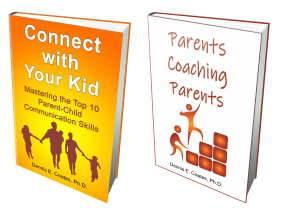Both my sons are 50 years old (plus or minus), have successful careers in IT, and in many ways are smarter than I am. They certainly do make more money than I do.
But honestly, I can’t take credit for how they turned out. Yes, I was mostly a kind father, I probably set a good example, and maybe I did one or two things that made a difference. But truthfully, they are self-made men. The choices they made and the effort they invested while growing up made them who they are today.
And in some ways, they survived the parenting of their mom and dad.
For example, I sometimes said things that I didn’t realize at the time may have been hurtful. As someone who has written extensively about raising kids, I’m now far more aware of what helps and what doesn’t. But back then (late 70s and early 80s), I pretty much didn’t know what I was doing as a parent. My grasp of effective communication skills would come later.
I’m sure there may have been a time that I said something like “What’s wrong with you?” or “Can’t you follow simple instructions?”
These are what I call “toxic questions.”
“What’s wrong with you?” is something a frustrated parent might say when their child has done something they’ve been asked not to do – for the umteenth time. The question implies this message: You’re flawed as a person. You’re too dumb to do what’s right, even after you’ve been told. You’re abnormal, there really is something wrong with you.
Horrible messages to send.
Or in a tired, overwhelmed moment a parent might say in a raised voice: “Why did you do that?” The question has no answer. No child knows why they sometimes do inappropriate things. But the question carries a hidden message: What you did is so stupid that I can’t imagine why you, or anyone for that matter, would do that. You’re incompetent.
A regular diet of hidden messages like these may be indistinguishable from psychological abuse. There are other, similar questions that imply hurtful messages:
- What do you think you’re doing?
- What on Earth were you thinking?
- How many times do I have to tell you…?
- What am I going to do with you?
- Why don’t you do what you’re told?
- What’s your problem?
Adults who ask questions like these don’t expect an answer. Instead, they’re sending a message. In your growing up, did any adult ever fire one of these zingers at you? How did it make you feel?
Of course I realize now that these are awful things to say, questions that strike at the heart of a child’s self-esteem. So why did I say them?
I may have said them because I felt tired and frustrated at the time, I didn’t appreciate their hidden meaning, and they were probably things my own parents used to say when they were tired and frustrated.
Still, toxic questions can do real damage to a kid’s self-esteem. During the first dozen years of growing up, most kids think their parents are perfect. Parents seem to know everything, while kids know relatively little about anything. So when they’re assaulted by the hidden message that they’re stupid, it’s very difficult for a young person to repudiate it. After being on the receiving end of many questions like these, a child’s self-esteem can erode.
One of the consequences of weak self-esteem during the second dozen years of growing up is being vulnerable to peer pressure, which can mean getting involved in self-damaging or even tragic behavior, just to be liked by other kids. Another horrible consequence: alienation and rebellion.
Please don’t feel bad if you’ve ever, in a weak moment, asked a toxic question.
Instead, get real about how these questions can impact a young child, the damage they can do. And resolve to react differently next time. For example:
- “I’m not happy with this, but I’m too tired to deal with it right now. We’ll talk about it later.”
- “We need to work this out. Give me a moment or two and we’ll talk about some ideas.”
- “I know how much you want this, but I don’t see how we can afford it. But maybe there’s some other way to cover the cost.”
- “Wow, what a mess! But hey, everybody makes mistakes, even your old dad. Let’s talk.”
You get the idea. The key is to feel your negative emotions rising and catch yourself before you ask the question that actually means you’re stupid. If you can do this successfully a few times, and if you keep trying, you can eventually make it a new habit.
The reward for doing so is huge. For one thing, you won’t have to look in the mirror and think, I’ve become my parents.
More about what I call “reactivity”…
My how-to book about communicating with your child: Connect with Your Kid: Mastering the Top 10 Parent-Child Communication Skills.
 This book, along with Parents Coaching Parents, will help you make change happen.
This book, along with Parents Coaching Parents, will help you make change happen.

